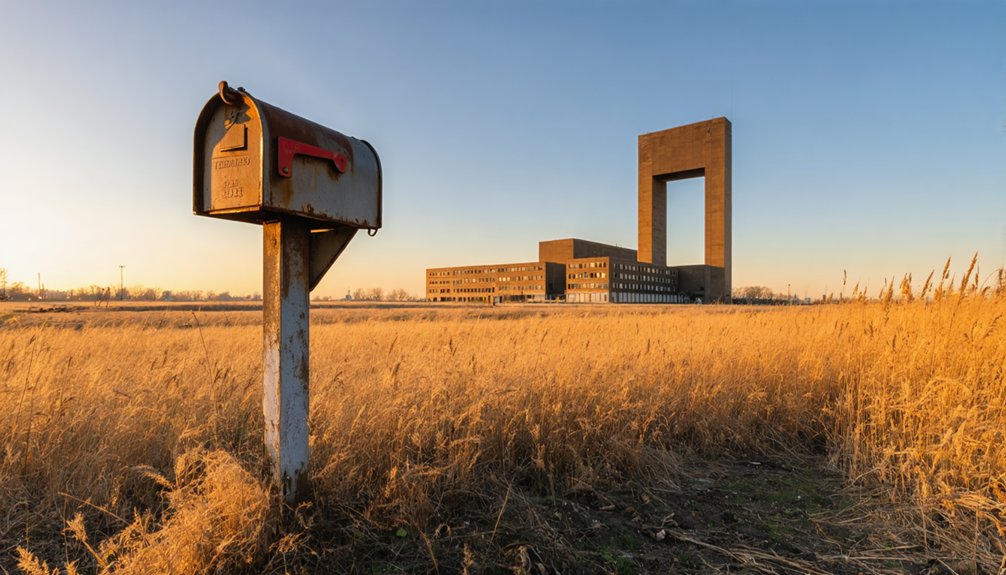You’ll find Weston in DuPage County’s history books as a brief but ambitious dream that lasted from 1963 to 1970. This planned community aimed to house 50,000 residents and North America’s largest mall near Batavia and West Chicago. After developer William Riley’s bankruptcy and legal battles, the federal government acquired the land for Fermilab in 1969. While only 100 homes were built, Weston’s story reveals how grand plans and federal priorities reshaped Illinois’s landscape.
Key Takeaways
- Weston was a planned community in DuPage County, Illinois, incorporated in 1963 but dissolved by 1970 due to federal land acquisition.
- The ambitious development planned for 50,000 residents and North America’s largest mall was halted after only 100 houses were built.
- Federal government acquired the land for Fermilab in 1969, using eminent domain to force residents to relocate.
- Original Weston homes still exist on Fermilab’s campus, now repurposed as housing for visiting scientists in Fermilab Village.
- The ghost town’s brief history is preserved through DuPage County Historical Museum’s “Ghost Towns” exhibit and Fermilab’s archives.
Early Settlement and Rural Origins
While various Native American tribes initially inhabited the DuPage County region, including the Illiniwek, Miami, and Pottawatomi, the area’s first permanent Euro-American settlement emerged in 1830-1831.
Early settlers Bailey Hobson and Captain Joseph Naper played pivotal roles in establishing the region’s foundations, with Hobson arriving in March 1831 and Naper following in July.
In 1831, pioneers Bailey Hobson and Captain Joseph Naper arrived just months apart, laying crucial groundwork for DuPage County’s development.
Before their arrival, French explorers like Father Jacques Marquette and Louis Joliet had traversed the area in 1673, and a French trapper named DuPage left his mark by having the local river named after him. The area would later become DuPage County in 1839, separating from Cook County.
The indigenous tribes who’d long called this land home gradually gave way to an influx of Euro-American settlers, who transformed the wilderness into organized townships by 1850.
By spring 1832, the settlement experienced rapid growth, reaching 180 inhabitants before concerns about the Black Hawk War prompted temporary evacuation to Chicago.
The West Field Development Era
The ambitious West Field development project emerged in the early 1960s as developer William Riley disclosed plans for a massive 50,000-resident community in DuPage County.
You’d have found an impressive vision that included 11,000 homes and North America’s largest mall, featuring around 2,000 stores.
Riley’s grand plans for West Field also called for an airport, athletics fields, a town center, and man-made lakes.
However, DuPage County quickly challenged the town’s incorporation, citing legal technicalities that questioned Weston’s authority to annex land.
The development plans crumbled just four months after the town’s revelation when Riley filed for bankruptcy in April 1964.
Remaining residents eventually sold their homes to the State of Illinois to make way for the new laboratory.
This legal and financial collapse effectively ended the dream of West Field becoming a thriving suburban hub.
The area was later chosen as the site for Fermi National Accelerator Laboratory in 1966.
Birth of an Ambitious City Plan
In western DuPage County, you’ll find that Weston’s ambitious planners envisioned North America’s largest shopping mall as the centerpiece of their development.
You’d have seen a massive retail complex designed to serve a projected population of 50,000 residents in this self-contained city near present-day Batavia and West Chicago.
The developers faced severe setbacks when legal technicalities prevented the town’s incorporation in 1964.
The grand mall plans exemplified the development’s bold scope, though these dreams would ultimately remain unrealized as the project faced mounting opposition from surrounding communities and legal challenges. William Riley’s proposal included an airport alongside the massive retail development, showcasing the extraordinary scale of his vision for Weston.
Grand Mall Dreams
During the early 1960s, developer William Riley revealed an ambitious vision that would’ve transformed DuPage County into a bustling metropolis. At its heart, you’d have found North America’s largest retail center – a revolutionary mall architecture featuring 2,000 stores designed to serve a planned population of 50,000 residents. The economic impact would’ve rippled through the entire region. Like East St. Louis in its prime, the development promised to be a symbol of optimism for the area’s future growth.
You wouldn’t just find shopping at this massive development. Riley’s master plan included everything you’d need in a self-contained city: 11,000 houses, man-made lakes for recreation, athletics fields, and even an airport. This innovative concept mirrored the success of cities like Blue Island, which had established itself as a regional commercial center through the 1970s.
The project aimed to integrate seamlessly with the existing West Field subdivision of 100 homes, creating a modern urban environment where you could live, work, and play all in one place.
Rapid Growth Projections
Riley’s grand mall vision sparked the beginning of what would become an unprecedented urban expansion plan. Growth expectations were staggering – you’d find yourself among 50,000 new neighbors in a city that would transform from West Field’s modest 100 homes into a sprawling metropolis of 11,000 residences.
The urban planning was remarkably ambitious. You’d have access to North America’s largest shopping center with 2,000 stores, alongside several man-made lakes dotting the landscape. The development drew inspiration from successful food industry pioneers like George Weston Foods, setting high standards for commercial growth.
The development wouldn’t stop there – you’d find yourself with convenient airport facilities, athletic fields, and a vibrant town center. The vision aimed to create a self-sufficient city where you’d have everything within reach, from essential services to recreational spaces, all carefully designed for rapid expansion.
Legal Battles and Community Resistance
While developers envisioned Weston as a thriving city of 50,000 residents, DuPage County’s lawsuit against William Riley dealt a fatal blow to the project’s future. The county challenged Weston’s incorporation on legal technicalities, leading to five postponed court cases and Riley’s eventual bankruptcy.
Despite these setbacks, the community fought back, organizing themselves and electing officials in their push for independence.
The legal complexities intensified as nearby villages opposed land annexation efforts, fearing overburdened schools and questioning the developer’s financial stability. Much like the earlier European American settlements of DuPage County, Weston’s founders hoped to establish a lasting community.
Through determined community activism, residents sought help from the US Atomic Energy Commission and fought for vital zoning changes. However, their efforts couldn’t overcome the mounting legal and financial obstacles.
Only 100 houses were built before the development collapsed, and the land was later absorbed into the Fermilab project.
Rise and Fall of Local Governance

Under the leadership of first president Arthur Theriault, Weston’s early governance showed promise for creating an independent municipality in DuPage County, Illinois.
You’ll find that DuPage County officials actively opposed Weston’s growth by challenging its incorporation efforts on technical grounds, effectively blocking the town’s development aspirations.
The final blow to Weston’s governance came in 1969 when the community dissolved following the federal government’s acquisition of the land for Fermilab, forcing residents to relocate and ending all hopes of municipal independence.
First President Arthur Theriault
Arthur Theriault emerged as a pivotal figure in Weston’s brief but significant history when he became the first Village President following its incorporation on October 23, 1963.
Under Theriault’s leadership, he steered the village through its most transformative period, playing an instrumental role in securing Weston as the future site of the National Accelerator Laboratory (now Fermilab).
As Village President, he tackled complex village challenges, including negotiations with state and federal entities for land transfer.
You’ll find his legacy preserved in the NAL Village Exhibit Hall, where he donated Weston’s original charter and corporate seal.
After overseeing the village’s final dissolution, Theriault served as trustee of village accounts and later moved to West Chicago, where he worked as a bank official.
The laboratory honored his service with a B-2 magnet outer coil.
County Opposition Blocks Growth
Despite initial plans for a thriving city of 50,000 residents, Weston’s growth came to an abrupt halt when DuPage County filed a lawsuit against developer William Riley in 1964.
The county’s legal challenge claimed Weston lacked proper incorporation rights, preventing it from annexing land for its ambitious development plans that included North America’s largest mall, an airport, and extensive housing.
You’ll find that community resilience emerged as residents faced mounting legal challenges. They petitioned to regain town status and even sought help from the US Atomic Energy Commission.
However, DuPage County’s strategic opposition prevailed, leading to Riley’s bankruptcy and the abandonment of development beyond roughly 100 homes.
The county’s actions ultimately cleared the path for federal acquisition, transforming what could have been a bustling city into the future site of Fermilab.
Final Dissolution in 1969
The final chapter of Weston’s brief existence unfolded in 1969, when federal acquisition for Fermilab sealed the community’s fate.
You’d find no public records of formal votes or ordinances detailing the dissolution process, as the community faced its final challenges quietly.
Through eminent domain, residents were compelled to sell their properties and relocate, effectively dispersing a once-hopeful suburban experiment in DuPage County.
While some original Weston houses still stand on the Fermilab campus, now serving as lodging for visiting scientists, they’re closed to public access.
Community memories survive primarily through archived documents and scattered personal accounts.
The dissolution marked more than just the end of a failed development – it demonstrated how federal priorities could reshape local landscapes, erasing an entire town from the map of Illinois.
The Fermilab Takeover

In 1966, a small Illinois village named Weston underwent a dramatic transformation when the Atomic Energy Commission selected it as the future site of the National Accelerator Laboratory. The village’s 450 residents had to give up their homes and properties as the state of Illinois purchased the land for what would become Fermilab.
You’ll find that Weston’s significance in scientific history was sealed on December 1, 1968, when ground was broken for the accelerator. Under Robert Wilson‘s leadership, the facility grew into a world-renowned research center.
While residents faced challenging relocations, receiving financial compensation for their properties, their sacrifice led to one of America’s premier particle physics laboratories. The village officially dissolved in 1970, and by 1974, the facility was renamed Fermilab in honor of Enrico Fermi.
Preserving Weston’s Memory
While Weston’s physical presence disappeared after 1970, several institutions have preserved its memory through dedicated exhibits and historical collections.
You’ll find the community’s historical significance showcased at the DuPage County Historical Museum‘s “Ghost Towns” exhibit, which uses photos, maps, and artifacts to tell Weston’s story.
Fermilab’s History and Archives Project maintains detailed documentation of the town’s brief existence.
The community legacy lives on in the repurposed houses at what’s now called Fermilab Village, where visiting scientists stay in original Weston homes.
In Fermilab Village, visiting researchers find temporary homes in preserved houses that once belonged to Weston’s original residents.
Though these buildings aren’t open to the public, they represent tangible links to the past.
Online historical summaries, scholarly works, and local history compilations continue to analyze Weston’s transformation from a hopeful suburb to an essential scientific site.
Frequently Asked Questions
What Happened to the Displaced Residents’ Compensation After Selling Their Properties?
You’ll find limited public records about residents’ displacement compensation after their property sales to the state, though it’s known they were required to sell for Fermilab’s construction in DuPage County.
Were Any Protests or Resistance Movements Organized Against the Fermilab Project?
While national NAACP leaders voiced civil rights concerns, you won’t find records of organized local Fermilab opposition in Weston. The village board’s unanimous 1966 vote to dissolve suggests minimal community resistance.
How Did Property Values Change During Weston’s Brief Existence?
You’d have seen your property assessments start promising in early 1960s, then crash during market fluctuations caused by legal battles, and finally bottom out when Fermilab’s selection forced government-determined selling prices.
What Recreational Activities and Social Gatherings Were Common in Weston?
Like a fleeting dream, you’d have found few organized community events in Weston. Any outdoor activities were likely informal gatherings at planned housing sites before Fermilab’s arrival ended the town’s existence.
Did Any Businesses Operate Successfully in Weston Before Its Dissolution?
You won’t find records of any significant business success in Weston’s local economy. Before Fermilab took over, it remained primarily residential without establishing any thriving commercial or industrial ventures.
References
- https://www.worldabandoned.com/weston
- https://drloihjournal.blogspot.com/2022/08/lost-towns-of-illinois-weston-illinois.html
- https://www.frrandp.com/2021/02/weston-illinois.html
- https://dupagemuseum.org/history-shines-a-light-on-dupage-ghost-towns-in-historical-museum-exhibit/
- https://history.fnal.gov/exhibit/weston.html
- https://www.youtube.com/watch?v=yOPl5qb8iag
- https://history.fnal.gov/historical/site/no_longer_weston.html
- https://dupage.illinoisgenweb.org/documents/919D88A2A426DDC8D29526DAAE8712D2B0A95B3E.html
- http://west-win.org/2024-10-dupage-county-origins/
- https://dupage.illinoisgenweb.org



